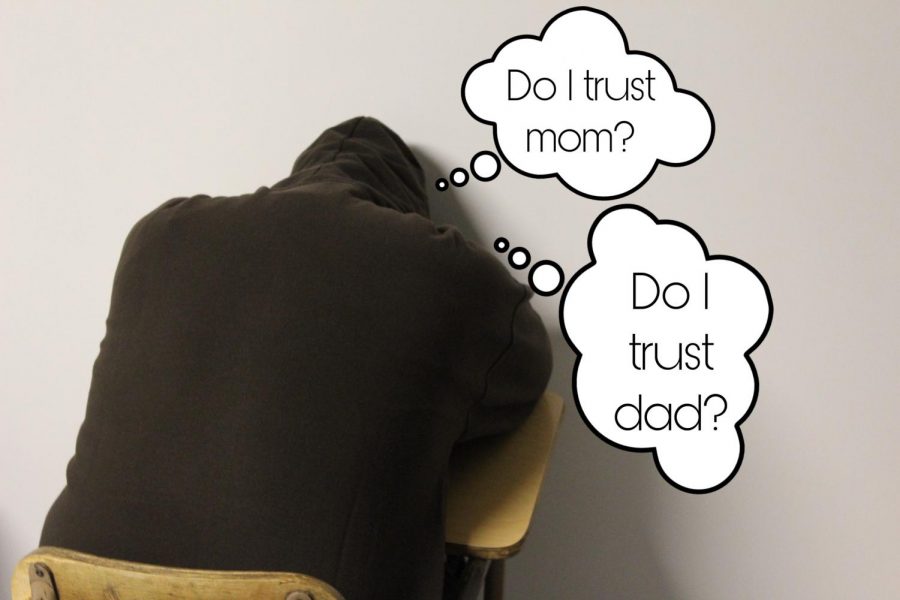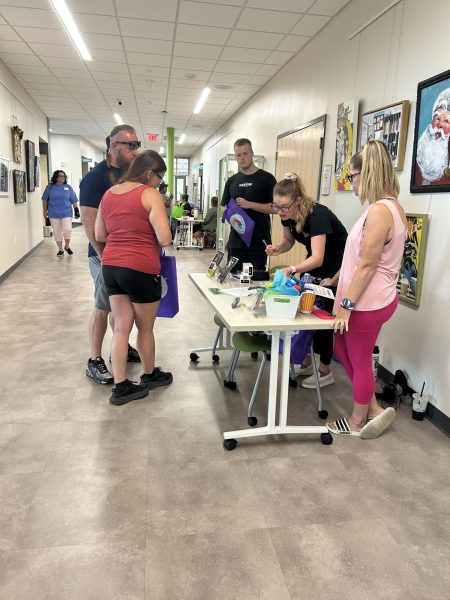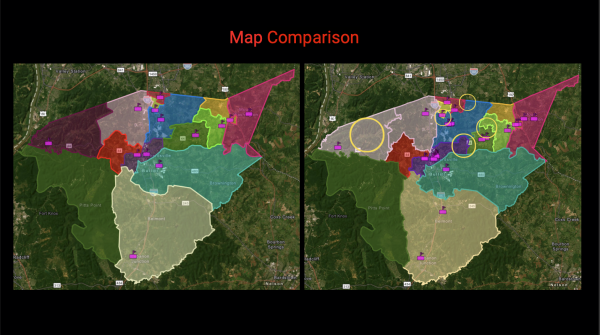The Unknown Parental Alienation Syndrome
A child with their head down, wondering, which parent should they trust. Parental alienation syndrome will make a child wonder which parent they’re supposed to trust. “Parental Alienation Syndrome is when one parent tries to poison a child against the other parent. And in some cases, it’s happening from both parents, and when it’s happening from both parents, it causes great confusion and causes some other behavioral problems,” said Licensed Clinical Social Worker Wayne Tanzer.
Parental Alienation Syndrome; one of the most unknown syndromes that a parent can do to a child, with one of the biggest effects.
Parental alienation syndrome is when a parent, or both parents, try to manipulate their child, and it could cause lots of confusion, and kids could question if they’re getting alienated or not.
Parental alienation syndrome is when one parent tries to mentally poison, or manipulate, a child into believing their stories. There are warning signs that the child could possibly give off, that could possibly mean they’re going through parental alienation syndrome. There are a few different ways of helping, no matter who you are, or what you’re connection to the person getting alienated is.
The most common thing that a parent does this for, is to get back at the other parent. The parents will usually be divorced, and they would probably have 50/50 custody of the child. Then, the parent that ends up doing the manipulation would usually be trying to make the kids mind believe that their house is a better house to live in, and they will normally keep on manipulating the child until they do what that parent wants.“My dad has been alienating me, like against my grandma, I guess. And he does that, I guess, because he wants us to go live with him, and wants us, just, to all live together, and to quote-on-quote be happy, when it’s not just going to be that easy,” said Sophomore Norma Jean Wisdom, “He does it to my sisters, and me, like all the time, but he’s kind of talked bad about her, my grandma, and it’s not okay.”
Youth Service Coordinator Erin Emington White, is a person that students will go to if they’re having trouble with their parents. She believes that if a child does feel the need to move over to another parent’s house, then they should if that child feels that that place is the safest for them, and still sees their other parent. “I think it’s whatever makes the child comfortable, and whoever has the appropriate boundaries that the child needs; because I often see kids who will go live with one parent, because they get away with more,” said White, “But if it is, like, they’re going to this parent because that’s where they feel safest, and they want to live there full time, as long as they see their other parent, and they have a relationship, I think that that’s okay.”
Parental alienation syndrome can happen in many different ways. It’s mostly done with divorced parents, and it will make the child think that one parent is better than another parent. “Parental Alienation Syndrome is when one parent tries to poison a child against the other parent,” said Licensed Clinical Social Worker Wayne Tanzer.
It could also even be done with divorced parents with both of them trying to manipulate the child’s mind, into the child believing one parents’ story, over the other one. “In some cases, it’s happening from both parents, and when it’s happening from both parents, it causes great confusion and causes some other behavioral problems,” said Tanzer.
On a normal basis, a child will not be going around willingly telling people that he or she is getting alienated. They’ll usually give off warning signs, and need to go see a psychologist first. “Usually the child winds up seeing a therapist, because he or she is acting out, being disruptive in school, being oppositional defiant, oppositional defiant to the parents, disrespecting the teachers, and disrespecting the parents,” said Tanzer.
Now, don’t think that if a child is acting this way then they must be going through the syndrome, because it really isn’t all that common. “Alienation syndrome is really not all that common. The problem with it is that when it does occur, it’s very serious. The child’s welfare is at stake, and you usually have two families, and even in some cases, members of the extended family will get involved and will talk down against the other parent, and sometimes the child gets deluged,” said Tanzer.
Although, if these warning signs do pop up a lot, then it’s probably time to help. “Warning signs could be that the child that is suffering from alienation, parental alienation syndrome, at times will want to engage in law-breaking, violating rules, violating the ‘norms’ of society,” said Tanzer.
When it comes to helping out a child that is going through this syndrome, it becomes pretty hard when it is a peer. The only thing that a peer can really do is to just listen, but sometimes it’s just hard to help them out, and they can’t, especially in Wisdom’s opinion. “It could help, just by like, listening, because like, people just have to vent, and when people feel like they can’t vent to people, because it’s awkward, and weird,” said Wisdom, “It would be easier, like when somebody tells you something like this, than be just like, ‘Oh, it’ll be okay.’ Like, give them actual advice, or give them, like, actual things that could help them; instead of just being like, ‘Oh, it’ll be fine,’ because everyone says it’ll be fine, but it’s not just that, it’s not going to be, ‘Oh, okay, it’s fine now.’ Like, it’s not that easy.”
If you’re a peer of someone that is getting alienated, you should just support as their going through their troubles. “So, I think the best way is to just support them, and understand that they are torn between two households, and that happens quite often. And if it’s really really severe, maybe they need to be referred for counseling, so they have a therapist who’s able to help them,” said White.
If you’re a teacher, you can help, but when it comes to kids acting out in school, it could sometimes end in a suspension. “Teachers can help, but in a lot of instances, if the child is really acting out in the classroom, there’s going to be a series of suspensions, either in-school suspension, and some do get suspended from school anywhere from one to three to five days. It all depends on the degree of how this child is acting out in the classroom; being disrespectful, being oppositional defiant, refusing to follow directions,” said Tanzer.
When it comes to helping in Tanzer’s way, he can recognize certain body movements, facial expressions and more, that will show him that that child he is dealing with, is going through that syndrome. “In my way, the first thing to do is listen, and actively listen, and notice facial expressions, body language, as well as the words, tone of voice. That is basically the beginning. The real important thing in all of this, is to get the parents in a session, just me and the parents, and get the parents on the same page,” said Tanzer.
Also, when it comes to helping, in White’s way, she tries to take the child’s positive relationship with a parent and navigate it. “What I focus on, is the positive relationship with each individual parent, and how to really navigate that with the other parent trying to get more of their time,” said White.
If you realize after reading this article, that you or someone you know is getting alienated by your parent, feel free to go talk to White, in her office, room 609, during school hours. “If there are any kids who really need to talk about this type of stuff, they’re welcome to come talk to me, and I could try to help,” said White.










